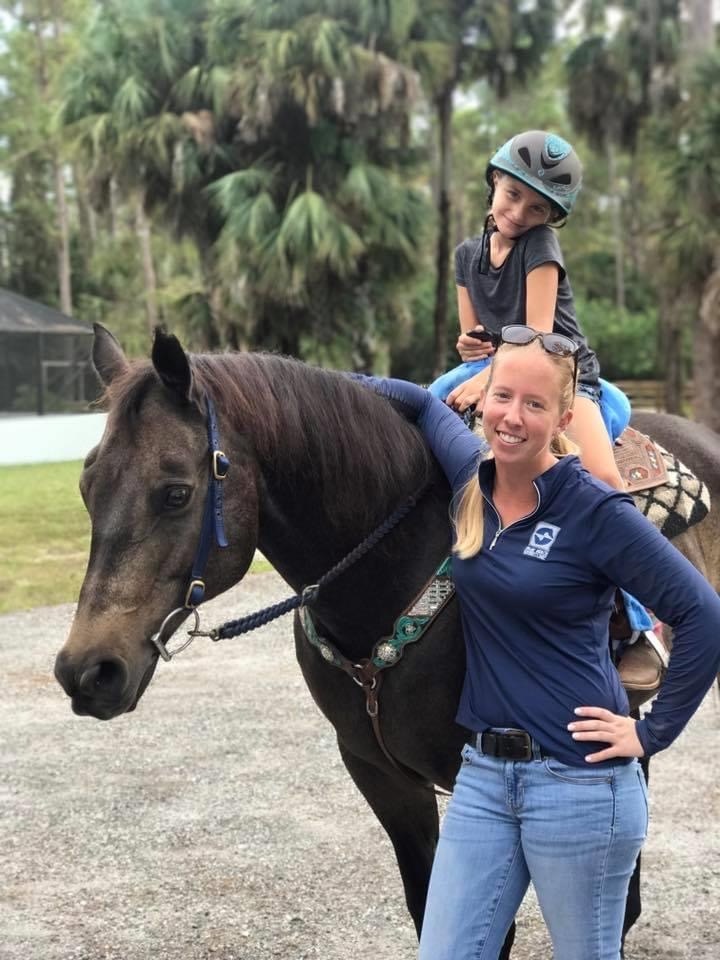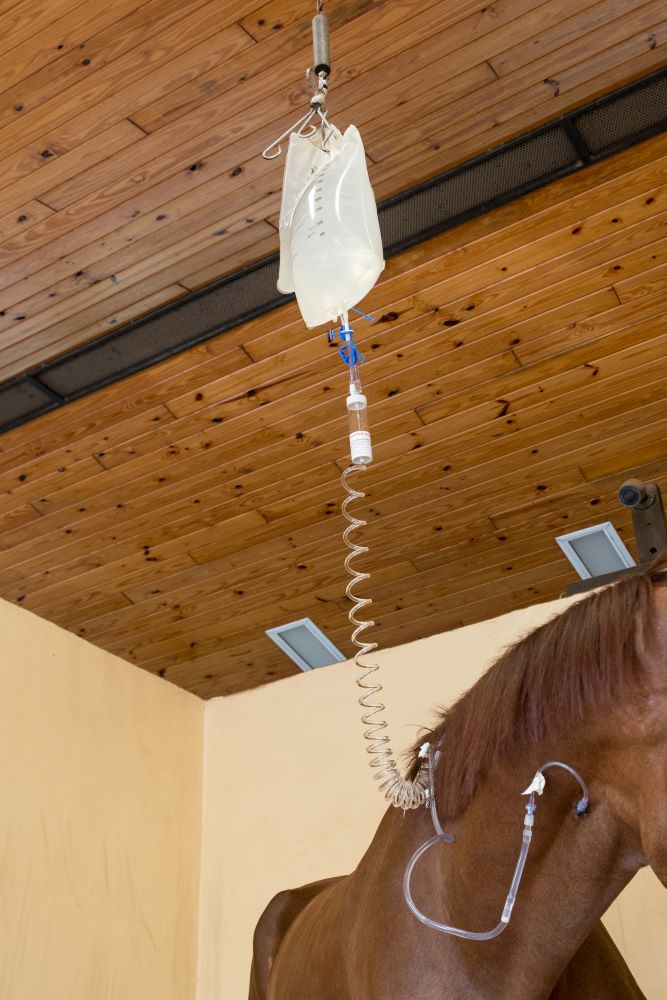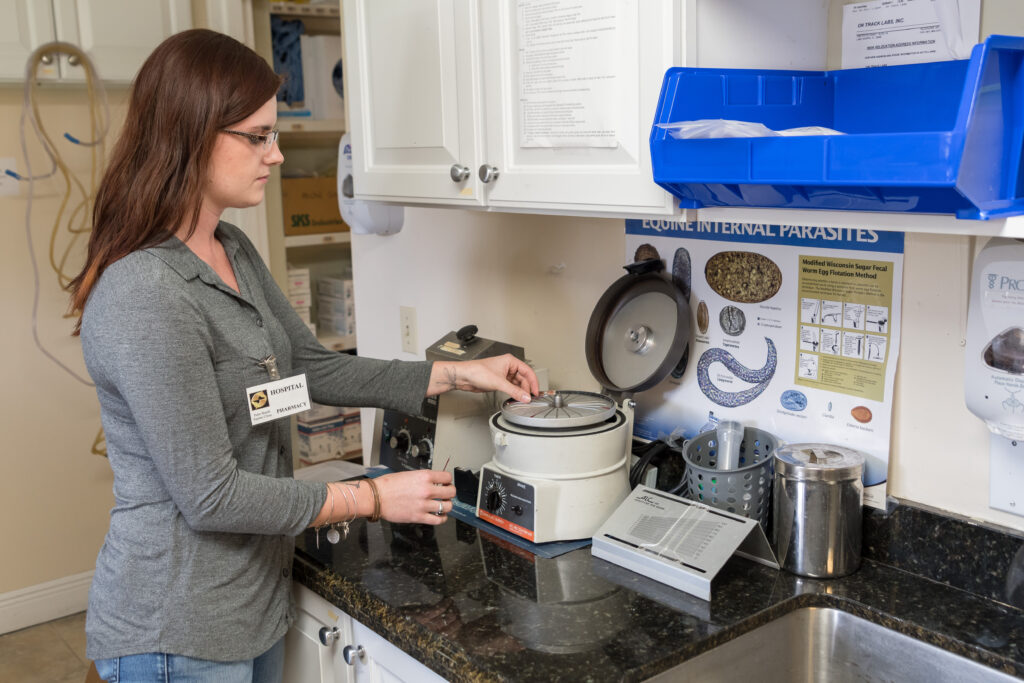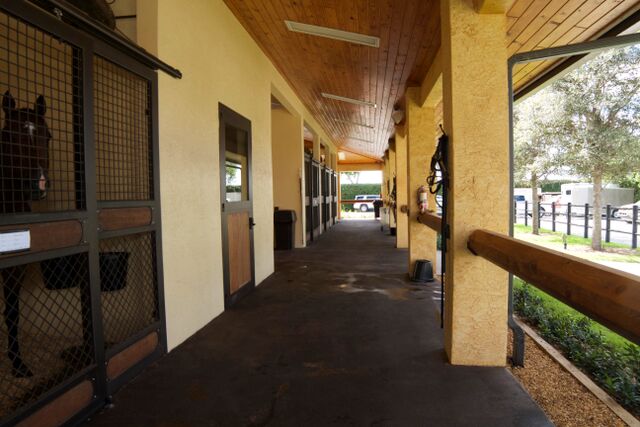Month: June 2017
Cassidy Hoff is a veterinary technician and assistant to Dr. Richard Wheeler of Palm Beach Equine Clinic. Originally from Middletown, CT, Cassidy joined the team at Palm Beach Equine Clinic in April of 2015.

What is your background with horses?
I’ve always had a passion for horses and I started riding lessons when I was seven years old. I attended Centenary College (now a University) in Hackettstown, NJ, and rode competitively as a student. I graduated in 2012 with a Bachelor of Science in Equine Studies with concentrations in Riding Instruction and Therapeutic Riding Instruction, receiving an additional PATH certification (Professional Association of Therapeutic Horsemanship International).
How did you start at Palm Beach Equine Clinic?
I moved to Florida after graduating from college in 2012 and landed my first job as the head instructor of a therapeutic riding center. I worked there for about three years. Through that experience, I realized that I had a strong interest in the veterinary side of the equine industry. Dr. Greenfield was the center’s primary veterinarian, which is how I learned about Palm Beach Equine Clinic. I applied for a job at Palm Beach Equine Clinic and the timing was perfect to work for Dr. Wheeler.
What is your typical day like?

We usually work six days a week, but during the busy winter season, seven days a week is more likely. Typically, my day begins around 8 a.m. and continues until we are finished with our client appointments. At the end of our day, I send out reports to clients we worked with throughout that day which contain discharge instructions for the findings from each appointment.
Dr. Wheeler mainly focuses on sport horse medicine. I assist him with lameness evaluations, joint injections, ultrasound exams, nerve blocks, and taking radiograph images. I am also responsible for keeping the truck well stocked and organized, replacing medications we use throughout the day and administrative work. Additionally, we complete many pre-purchase exams and I am responsible for putting together the findings for the final exam documents.
What do you like most about your job?
I love the teamwork aspect. A lot of the horses we treat compete in the WEF Saturday Night Lights or in the AGDF Friday Night Stars classes. Being able to watch these top competitions is even more exciting when you know the horse and their whole team! I feel lucky to be working with Palm Beach Equine Clinic and these horses at the top levels of their sport, and even more fortunate that the clients are amazing to work with. It takes a village to get a horse to the top levels and it is really exciting to be a part of that.
What do you do when you are not working?
I still try to find time to ride, which will always be a passion of mine. It is a little bit easier during the off-season summer months. I also enjoy going to the beach, hanging out with friends and reading.
It’s no secret that in nearly any medical condition, early diagnosis can lead to a better prognosis – and colitis in horses is no exception. The inflammation of the colon that defines colitis can be fatal, although fortunately, with the proper detection of symptoms and immediate treatment, a positive outcome and recovery far outweigh a negative ending.
Understanding colitis – the symptoms, diagnostics, and treatment— can help in recognizing the condition. Palm Beach Equine Clinic’s Dr. Selina Watt has helped provide some fundamental information that horse owners and barn managers should be aware of in regards to equine colitis.
Understanding Colitis and Its Causes
Located in the equine hindgut is the large colon, where microbial digestion and water absorption occurs. The large colon averages 12 feet in length and can hold approximately 20 gallons of feed material and water. When the colon becomes inflamed, the horse is diagnosed with colitis.
While the general definition of colitis is simple and straightforward, the causes can be broader. However, two of the most prevalent causes of colitis are bacterial infections or overuse of medication. Colitis from infectious bacteria is often caused by agents such as Salmonella, Clostridium difficile, or Neorickettsia risticii (Potomac Horse Fever). The non-infectious, right dorsal colitis is often related to the use of non-steroidal anti-inflammatory drugs such as phenylbutazone (Bute).
No matter the cause, each form of colitis leads to a similar inflammation of the large colon. The inflamed colon causes the horse to have diarrhea, as the colon is unable to properly perform its job of adequately absorbing water, electrolytes, and nutrients from the intestinal content. As the condition progresses, leaky membranes of the colon may cause a release of toxins into the bloodstream and the horse will suffer a loss in protein levels. This condition can ultimately affect the entire body as bacteria and toxins circulate, potentially leading to laminitis, founder, protein deficiencies, and a greater risk of complications or lack of a full recovery.

Symptoms and Diagnostics
The first and most conspicuous symptom of colitis is diarrhea. If diarrhea persists, horses can begin to show signs of dehydration and protein loss due to the volume of fluids and nutrients being excreted. Keeping a watchful eye on the consistency of your horse’s manure can be key to catching this condition early. Fever or a lack of energy or appetite may be indicators of colitis and it is recommended to not wait to see what develops but to rather contact a knowledgeable veterinarian for proper diagnostics right away.

Once the horse is under the care of a veterinarian, one of the first things that should be done is bloodwork. In the case of colitis, bloodwork will show decreased white blood cells and protein levels. The severity of the results will indicate how advanced or severe the condition may be. The horse will also generally present with an elevated temperature, and a diagnostic abdominal ultrasound will likely show thickening of the intestinal wall.
Following the initial diagnosis of colitis, a fecal sample is sent to a laboratory where it is tested and analyzed for various forms of bacteria. Comprehensive laboratory results will determine whether the colitis case is infectious or non-infectious. Non-infectious cases can also be diagnosed based on the horse’s history, such as if the horse has been administered Bute for a prolonged period of time.
Treatment and Prognosis
Horses affected by colitis generally require hospital admittance, as they will need fluid therapy and gastro protectants to aid the intestinal wall. If the colitis is caused by infectious bacteria, the patient will also require antibiotic treatment and proper biosecurity measures to prevent transmission. If the bloodwork indicates low protein levels, plasma therapy may also be necessary.
At Palm Beach Equine Clinic, the intensive care management team consists of veterinarians and hospital staff available 24 hours a day, seven days a week. Equine colitis cases cannot simply be administered fluids and left to improve, instead, they require careful monitoring around the clock. If the veterinarian feels the colitis case is severe, the horse may need hourly assessments. This can be of the utmost importance, as colitis cases often rapidly deteriorate without proper veterinary monitoring and swift care.
There is no guaranteed prevention plan for colitis, however, careful management of non-steroidal anti-inflammatory drugs and optimal nutrition can help minimize a horse’s risks of developing the non-infectious colitis condition. With early detection, diagnosis, and proper treatment, equine colitis patients present a positive prognosis.
To ensure the health of your horse, the veterinary team at Palm Beach Equine Clinic is available 24/7. Speak with a Palm Beach Equine Clinic veterinarian regarding the proper medication and nutritional needs of your unique horse by calling 561-793-1599.
